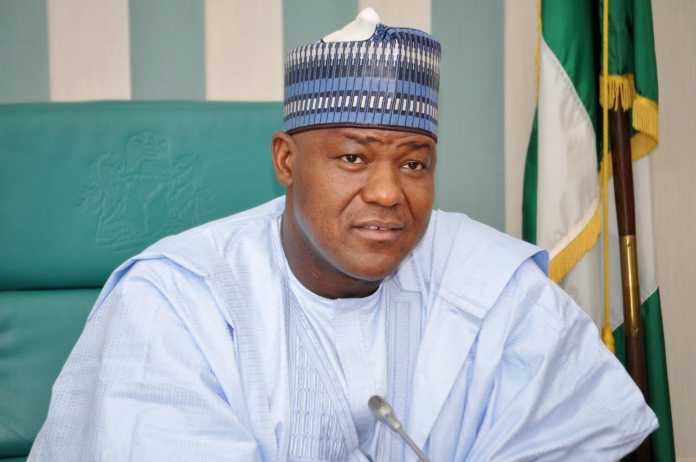This post has already been read 6092 times!
The Speaker of the House of Representatives, Yakubu Dogara has decried the power situation in the country despite the humongous investments made into the sector by the government over the years.
According to him, it was the pathetic power situation that has forced Nigerians into committing N5b annually on procurement of generator set.
While he described the situation as unacceptable, the Speaker pledged the resolve of the House to work with the Executive towards finding a permanent solution to the power generation and distribution challenges in the country.
Towards this end, he disclosed that the House is reviewing some of Nigeria’s energy laws in order to provide an appropriate legal framework that will facilitate the exploitation of renewable energy to the benefit the Nigerian economy.
The Speaker, who spoke Tuesday during a public hearing on three power sector reform Bills said, “Power is arguably the single most important driver of the national economy. Our industries and factories need electricity to run; and so do our offices, homes and businesses.
“It is estimated that Nigerians spend about $5 billion US Dollars yearly to fuel their generators. This is an unacceptable situation and the House of Representatives stands ready to support the Executive arm of government to put a stop to this state of affairs.
“We can only be self-sufficient in the energy field when we combine all of our energy resources such as wind, solar, hydro, biomass, bio-fuel, landfill, sewage gas, solid waste, geothermal energy, ocean energy etc.
“Renewable energy sources are natural and often replenishes itself. Nigeria needs to invest more in renewable energy as fossil fuel is a diminishing asset.
“An appropriate legal framework to exploit renewable energy which is nature’s gift to mankind is not adequate in Nigeria. This makes it difficult to organise the sector in a commercially viable matter. Herein lies the merit and strength of this Bill under consideration”.
Minister of Power, Works and Housing, Babatunde Fashola aligned with the proposed establishment of Renewable Energy Fund in Nigeria, saying there is a need for holistic review of the legislative frameworks governing the power industry.
Represented by Louis Edozien, Permanent Secretary of Federal Ministry Power, the Minister however submitted that the fund be used as equity participation in renewable energy projects, and should exclude the Commission as a player, which regulates the sector.
He also proposed that the fund should be managed by the NERC not Board, in addition to allowing the Commission to determine the remuneration of its staff as a technical and institutional monitor of the power value chain.
“There is no doubt that establishment of a dedicated fund to renewable energy us a sound and pragmatic policy. It is however important, in our view, to critically review the provisions relating to the operation of the Fund as provided in the bill,” Fashola said.
On the amendment of the 12 year old Power Sector Act, Fashola said the Act was able to trigger transformation of the Nigerian power sector from a State monopoly to competitive electricity market.
“What is needed to ensure that the Act continues to provide an enabling legal framework for the power sector is holistic review.
“This is a review that will take into consideration the effectiveness, or otherwise of extant provisions in the light of our experience in the last one decade.
“Any amendment of the Act at this stage ought to take into consideration lessons learnt and challengers encountered in the course of implementing the provisions of the Act.
“The amendment is also expected to address some fundamental issues that are militating against the power value-chain.
“It is also important that the provisions that will be introduced will assist to strenghtem the framework for power sector reform.
“For all the foregoing reasons and in order to ensure that maximum traction is gained from an amendment of the EPSRA, it is our humble position that we use the opportunity of this present bill to consider an exhaustive review of the bill”.
According to him, the privatization of Power Holding Company of Nigeria (PHCN) was triggered by the enactment of Electricity Power Sector Reform Act which was completed in 2013.
He said: “Power generation and distribution are no longer ‘public utilities’ in the strictest sense. On the contrary, power generation and power distribution are now largely in the hands of private sector investors.
The object of the bill may not therefore be defeated if its focus is ‘public utility’.
“In order words, the Commission is already empowered by the National Assembly to regulate and develop necessary framework for renewable energy in Nigeria.
“It is my understanding that it is in furtherance of this power that the commission issued its regulations on feed-in tariff for renewable energy sourced electricity in Nigeria.
“It is important to point out that the objective of this regulation is to develop, promote and harness the renewable energy resources of the country and incorporate all viable ones into the national energy mix.
“As the House may be aware, the current national renewable energy and energy efficiency policy targets for 30 percent of all generation to come from renewable energy by 2030.”
In its presentation, Nigerian Electricity Regulatory Commission (NERC) noted that the Commission is duty bound to publish its audited account, in two national dailies without the mandate of the Minister.
While the Commission opposed the establishment of another agency, it proposed upward review of penalty from N20,000 to N500,000 for failing to publish the audited accounts.
The Commission also stated that cooperation of State governments was required in its investigation of the recurring accident in the power sector as a preventive measure.
Omojuwa.Com



